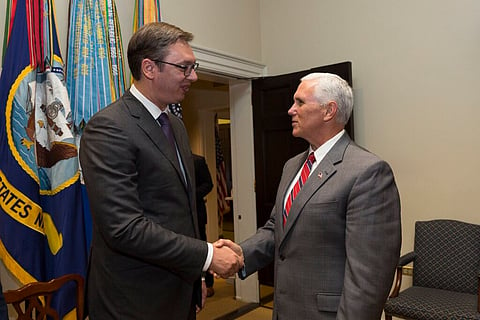

Tens of thousands of demonstrators gathered in Serbia’s capital, Belgrade, over the weekend for a large-scale anti-corruption rally, marking one of the most significant challenges to President Alexander Vučić’s hold on power. The protest, which drew university students and citizens from across the country, saw participants waving flags and chanting slogans as they marched through the city. Many Belgrade residents welcomed the protesters, underscoring widespread public support for the movement.
The rally on Saturday is seen as the culmination of months of anti-graft demonstrations in the Balkan nation. These protests have increasingly pressured Vučić’s government, which has faced accusations of corruption and authoritarianism. The president, who has maintained a firm grip on power since becoming prime minister in 2014 and then president in 2017, has dismissed the demonstrators’ demands, vowing not to step down. “You will have to kill me if you want to replace me,” Vučić said in a defiant statement earlier this week.
Tensions Rise as Vučić Warns of Violence
Ahead of the rally, Vučić repeatedly warned of potential violence, claiming that security forces would use force if necessary to maintain order. His supporters have also set up camp in a park near the presidential palace, raising concerns about possible clashes between pro-government and anti-government groups. The president has accused Western intelligence services of orchestrating the protests to destabilize his government, though he has provided no evidence to support these claims.
“I do not accept blackmail, I will not agree to pressure. I am the president of Serbia, and I won’t allow the street to set the rules,” Vučić said, reiterating his refusal to bow to public demands. Despite his warnings, the protests have continued to grow, reflecting deep-seated frustrations among Serbians over corruption and governance issues.
The demonstrations represent a pivotal moment for Serbia, as citizens increasingly demand accountability and transparency from their leaders. With tensions running high, the situation remains volatile, and the government’s response could have significant implications for the country’s political future.